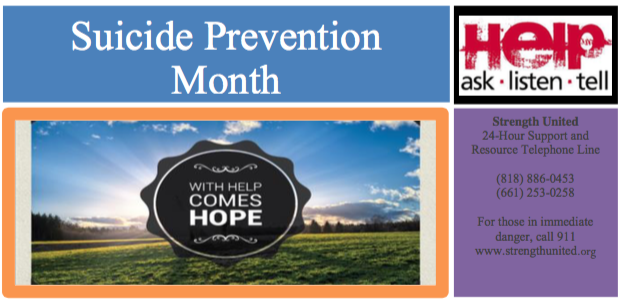WHAT YOU NEED TO KNOW
Facts About Suicide
According to the Centers for Disease Control:
- Over 38,000 Americans over the age of 18 die from suicide each year.
- Suicide is the tenth leading cause of death in the U.S. for all ages.
- There is one suicide for every 25 attempts.
- There is a suicide in the U.S. every 13 minutes.
Warning Signs
Here are some things to look out for:
- Disrupted sleep
- Isolating self from friends and family
- Loss of interest in activities
- Feelings of hopelessness
- Extreme self-hatred
- Feelings of not belonging
- Thinking of self as burden on others
- Sudden mood changes
- Increased alcohol or drug use
- Talking about suicide or ways of killing oneself
- Giving away personal belongings
- Momentary happiness after long periods of sadness
Talking to a Person about Suicide
Talking to someone about suicide can seem very difficult; however, the best way to help is to speak up.
Ways to start a conversation about suicide:
- I have been feeling concerned about you lately.
- I have noticed some differences in you and want to see how you are doing.
- I wanted to check in with you; it seems you haven't been yourself lately.
Questions you can ask:
- When did you begin feeling like this?
- Did something happen that made you start feeling this way?
- How can I support you right now?
- Have you thought about getting help?
What you can say to help:
- You are not alone in this. I'm here for you.
- You may not believe it right now, but the way you are feeling right now will not last. We can get through this together.
- I may not be able to understand exactly how you feel right now, but I care about you and want to help.
Suicide Prevention Tips:
- Speak up if you're worried. If you spot the warning signs of suicide, talk to that person immediately.
- Respond quickly in a crisis. If you think someone you know is going to attempt suicide, call a local crisis line, dial 911, or take that person to an emergency room immediately.
- Offer help and support. Encourage them to get professional help and to make positive lifestyle changes, make a safety plan in case of crisis and make sure to continue to support them for a long period of time.
Resources:
- National Suicide Prevention Lifeline
1-800-273-TALK (8255) - National Hopeline Network
1-800-SUICIDE (784-2433) - The Trevor Project - Crisis intervention and suicide prevention for lesbian, gay, bisexual, transgender, and questioning (LGBTQ) youth.
1-866-488-7386
Click the links below for this brochure in PDF form.
In English
In Spanish




